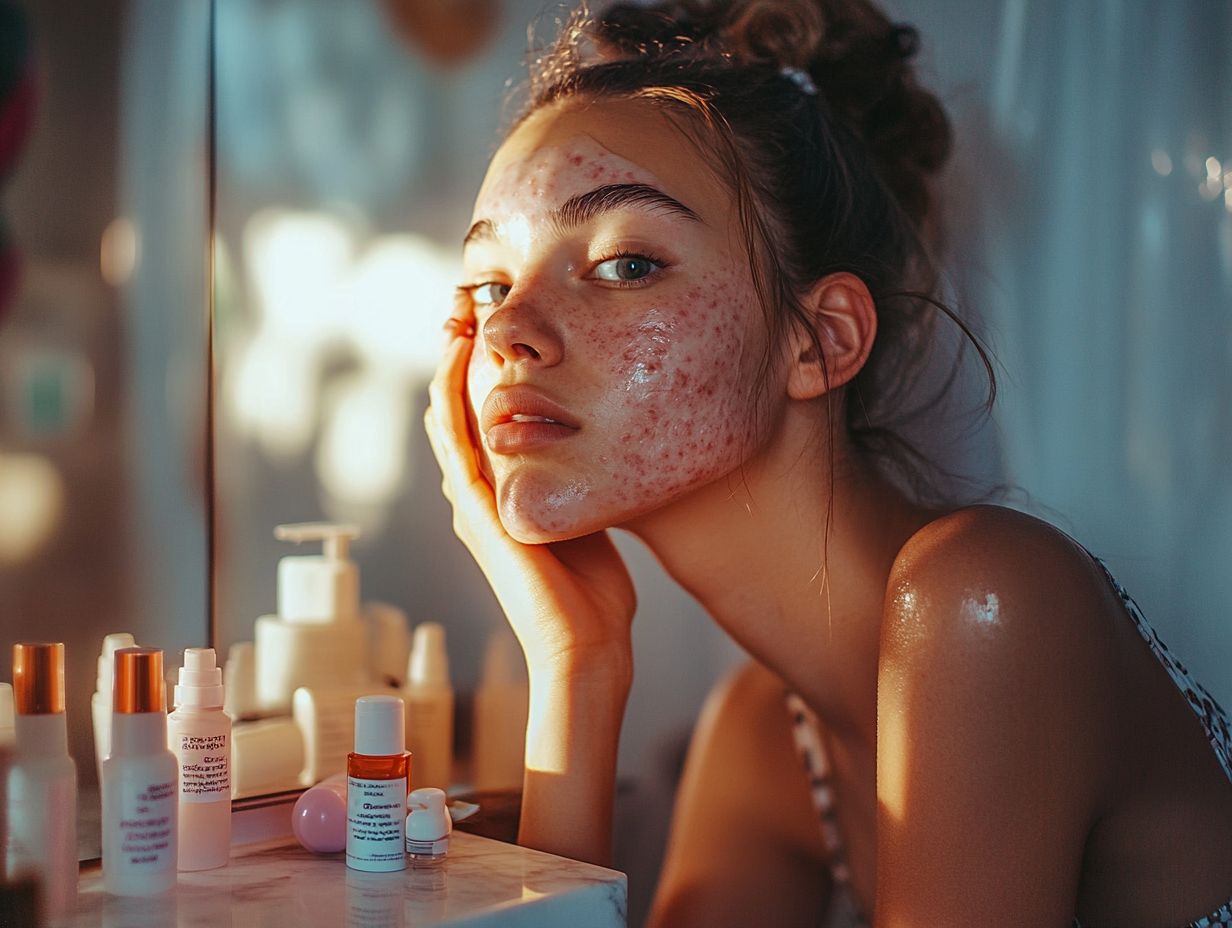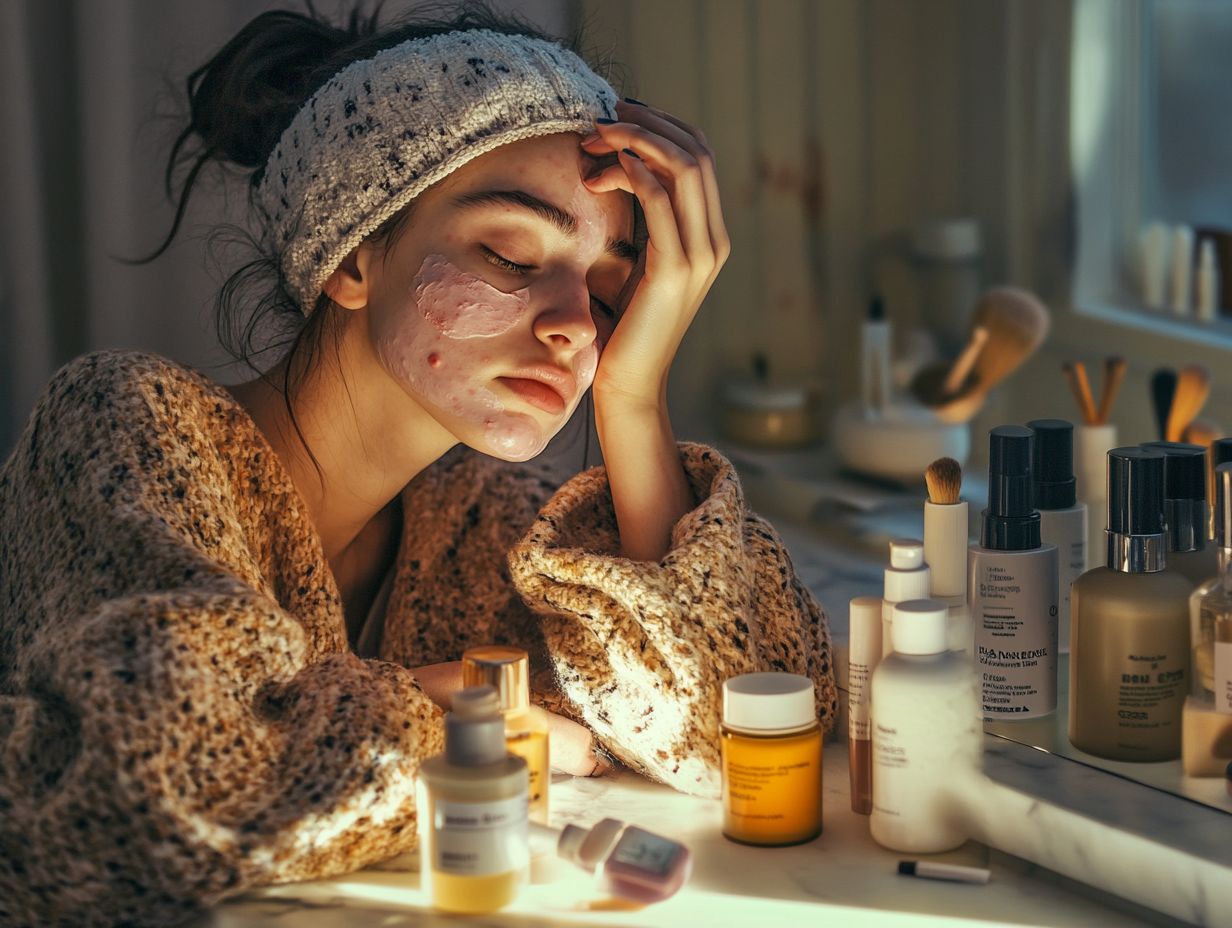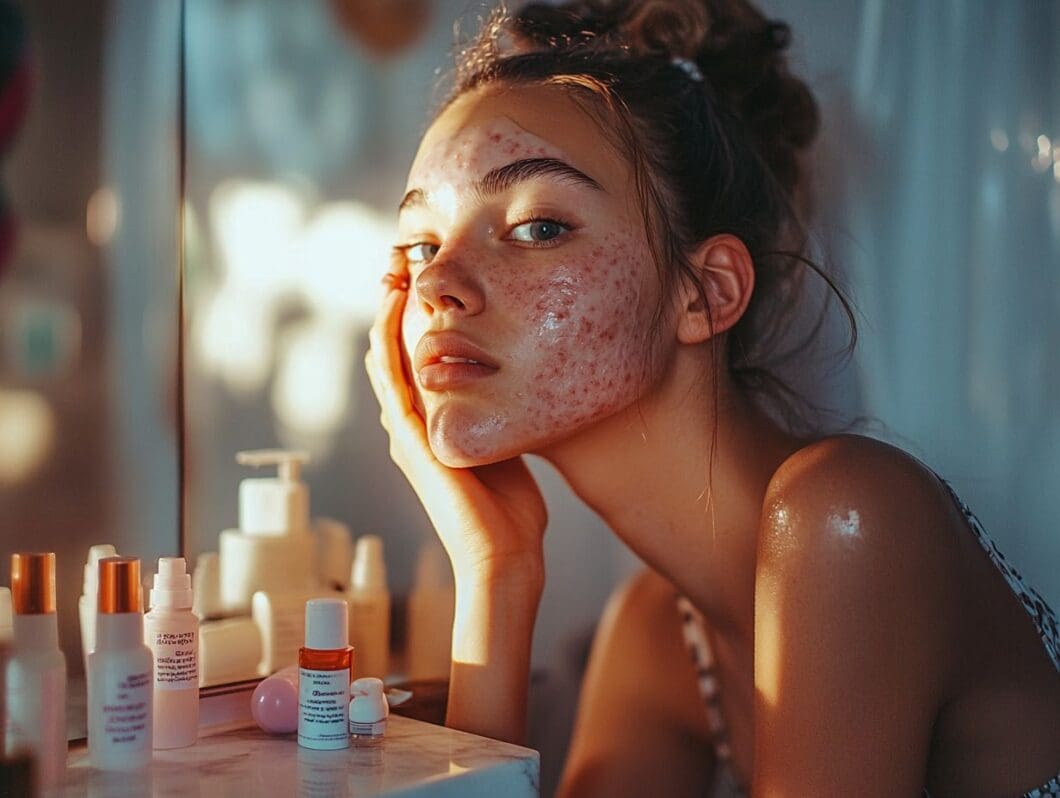Adult acne can be frustrating and confusing, affecting self-esteem and daily life.
This article explores the various causes and triggers of adult acne, shedding light on why it persists into adulthood.
It discusses effective treatment options, including topical and oral medications, as well as natural remedies.
Practical tips for preventing breakouts through healthy skincare habits and lifestyle changes are also covered.
Additionally, it addresses how to manage and treat acne scars, helping you regain your confidence.
Key Takeaways:

Understanding Adult Acne
A thorough understanding of adult acne is crucial for individuals affected by this persistent skin condition, as it can significantly impact self-esteem and overall skin health.
Adult acne may present in various forms, including hormonal acne, inflammatory acne, and cystic acne, each necessitating distinct treatment and management strategies. Factors such as hormonal fluctuations, sebum production, and dietary influences significantly contribute to the development of acne lesions.
Therefore, it is essential for individuals experiencing adult acne to be informed about the underlying causes and symptoms associated with this condition.
Causes and Triggers
The causes and triggers of adult acne are complex and varied, encompassing hormonal fluctuations related to pregnancy and menopause, as well as dietary influences such as high glycemic index foods that may worsen pimple formation. For more information, you can read about how to deal with adult acne.
Stress is a significant factor in triggering acne outbreaks, as elevated cortisol levels can result in increased oil production and inflammation. Additionally, certain medications, particularly those that affect hormonal balance, can substantially impact skin health and lead to undesirable breakouts.
Understanding these diverse triggers is crucial for individuals experiencing acne, as identifying personal factors can facilitate the development of targeted treatment strategies. By recognizing the specific elements that exacerbate their symptoms, individuals can take proactive measures to manage their skin more effectively and restore their complexion to a healthier state.
Treatment Options

In addressing treatment options for adult acne, multiple approaches are available that cater to various acne types and individual skin conditions.
These options include topical retinoids, benzoyl peroxide, and salicylic acid, all of which are commonly utilized in acne treatment products.
Topical Medications
Topical medications such as benzoyl peroxide, salicylic acid, and topical retinoids like Adapalene are widely utilized for the treatment of acne, owing to their effectiveness in reducing inflammation and preventing the formation of pimples.
These treatments address the underlying causes of acne, including excessive oil production, clogged pores, and the presence of bacteria. For example, benzoyl peroxide functions by eradicating acne-causing bacteria and aiding in the drying of existing blemishes, while salicylic acid provides gentle exfoliation, facilitating better penetration and unclogging of pores. Conversely, topical retinoids enhance skin cell turnover, which not only aids in clearing current breakouts but also significantly diminishes the likelihood of future occurrences.
It is important to be cognizant of potential side effects, such as dryness, irritation, and increased sensitivity to sunlight, which can be effectively managed through appropriate skincare routines. Ultimately, when applied correctly, these topical treatments not only aid in acne clearance but also play a vital role in preventing scarring, resulting in healthier and more resilient skin.
Oral Medications
Oral medications, specifically spironolactone and corticosteroids, can provide considerable relief for adult acne, particularly in women experiencing hormonal fluctuations associated with conditions such as polycystic ovary syndrome (PCOS).
These treatments primarily address the hormonal imbalances that contribute to the development of acne. Spironolactone, a potassium-sparing diuretic, reduces sebum production and mitigates inflammation, making it especially effective for acne driven by elevated androgen levels. Conversely, corticosteroids can decrease inflammation and redness, offering rapid relief during flare-ups. For more information, check out this guide on How to Deal with Adult Acne.
It is essential to recognize that these medications are not universally applicable; they should be prescribed for specific cases deemed appropriate by qualified healthcare providers. The potential side effects, including weight gain, mood changes, and hormonal irregularities, highlight the importance of close medical supervision during treatment to ensure both efficacy and safety in managing this dermatological concern.
Natural Remedies

Natural remedies for acne management may serve as effective adjuncts to conventional treatments. Options such as tea tree oil and dietary modifications that emphasize whole foods and low-glycemic index meals can address acne symptoms from a holistic perspective.
Integrating these approaches enables individuals to adopt a more comprehensive approach to their skin health, potentially alleviating breakouts while supporting overall well-being. For example, turmeric, known for its anti-inflammatory properties, can be applied topically or incorporated into a diet abundant in fruits, vegetables, and omega-3 fatty acids. Additionally, maintaining proper hydration and engaging in regular physical activity can further enhance skin vitality and minimize excess oil production.
These lifestyle choices not only promote clearer skin but also bolster the body’s natural healing processes, making them valuable components of any acne treatment regimen.
Preventing Adult Acne
Preventing adult acne necessitates a comprehensive approach that encompasses healthy skincare practices and lifestyle modifications. For more information on this condition, check out How to Deal with Adult Acne. Such measures are essential for maintaining optimal skin health and minimizing the occurrence of acne breakouts in individuals predisposed to this condition.
Healthy Skincare Habits
Establishing healthy skincare habits is crucial for individuals with acne-prone skin, as these practices can significantly reduce the likelihood of acne breakouts and enhance overall skin condition.
By implementing a well-considered daily routine, individuals can prioritize effective cleansing methods designed to remove impurities without stripping the skin of its natural oils.
The selection of appropriate products is integral to this process; opting for gentle, non-comedogenic cleansers and toners can help prevent clogged pores while ensuring adequate hydration.
The importance of moisturizing cannot be overstated; a high-quality moisturizer plays a vital role in restoring the skin’s barrier function, thereby protecting against external irritants and minimizing potential acne triggers.
Consistently adhering to these steps not only fosters clearer skin but also contributes to increased confidence and overall well-being.
Diet and Lifestyle Changes

Diet and lifestyle modifications can significantly impact acne management, as certain dietary factors, such as sugar intake and dairy consumption, have been associated with increased acne triggers in some individuals.
By adopting a more nutritious dietary approach, individuals can markedly reduce the likelihood of experiencing breakouts. Incorporating a diverse range of fruits, vegetables, healthy fats, and whole grains into daily meals can help achieve a balanced nutrient profile, while adequate hydration is crucial for effective skin detoxification.
Additionally, managing stress through mindfulness practices, such as yoga or meditation, can substantially contribute to hormonal balance, potentially reducing the frequency of acne outbreaks.
It is important for individuals to recognize that a combination of dietary adjustments and mindful lifestyle choices creates a synergistic effect that promotes clearer skin.
Dealing with Acne Scars
Addressing acne scars is a critical component of post-acne care, as different types of scars can develop from prior acne lesions. This condition requires targeted treatment options to enhance skin texture and overall appearance.
Types of Scars and Treatment Options
There are various types of acne scars, each necessitating distinct treatment options to effectively address concerns related to skin texture and appearance. For those dealing with adult acne, it’s essential to understand the different treatments available. You can find helpful information in this guide on How to Deal with Adult Acne. These include atrophic, hypertrophic, and keloid scars.
Atrophic scars are characterized by a sunken appearance, resulting from collagen loss during the healing process, which leads to varying degrees of pitting. In contrast, hypertrophic scars are raised and develop when excess collagen forms during the healing phase following acne lesions. Keloid scars, although less prevalent, can arise when the skin overproduces scar tissue, often extending beyond the original wound.
Treatment options for each type of scar can range from topical applications to more advanced procedures such as microneedling or laser therapy. It is imperative for individuals to consult a dermatologist for a thorough evaluation of their specific skin type and scarring. This ensures the development of a tailored treatment plan that effectively addresses unique skin concerns.


